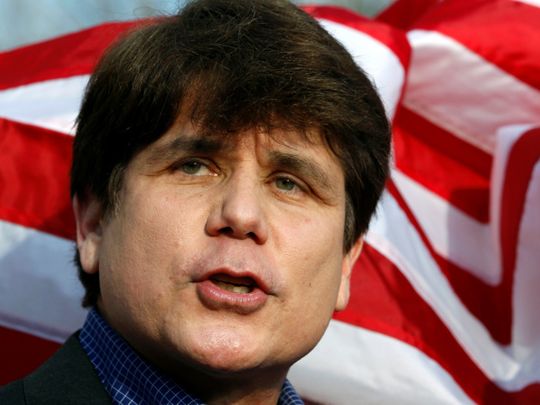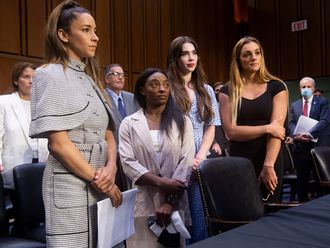
Washington: President Donald Trump commuted the 14-year prison sentence of former Governor Rod Blagojevich of Illinois, the Democrat who was convicted of trying to essentially sell Barack Obama’s vacated Senate seat for personal gain, and pardoned financier Michael Milken and Bernard Kerik, the former New York City police commissioner, the president announced Tuesday.
“Yes, we commuted the sentence of Rod Blagojevich,” Trump told reporters just before boarding Air Force One for a four-day trip to the west coast where he is scheduled to hold three campaign rallies. “He served eight years in jail, a long time. He seems like a very nice person, don’t know him.”
Kerik, the former New York City police commissioner, was convicted of tax fraud and lying to the government. And Trump said he had also pardoned Milken, the investment banker who was known in the 1980s as the “junk bond king” and who has fought for decades to reverse his conviction for securities fraud.
Trump commuted the former governor’s sentence on Tuesday after saying for years that he was considering intervening in Blagojevich’s case.
By commuting the sentence, the president would free Blagojevich from prison without wiping out the conviction. Republicans have advised the president against it, arguing that Blagojevich’s crime epitomides the corruption that Trump had said he wanted to tackle as president.
The president’s decision came the same day that he pardoned Edward DeBartolo Jr., a former owner of the San Francisco 49ers who pleaded guilty in 1998 to concealing an extortion attempt and eventually surrendered control of his team.
DeBartolo, the scion of a prominent real estate development family who created one of the National Football League’s greatest dynasties, was prosecuted after agreeing to pay $400,000 in brand-new $100 bills to Edwin Edwards, the influential former governor of Louisiana, to secure a riverboat gambling license for his gambling consortium.
DeBartolo avoided prison but was fined $1 million and suspended for a year by the NFL. He later handed over the 49ers to his sister Denise DeBartolo York. His nephew Jed York currently runs the team, which made it back to the Super Bowl this year only to fall to the Kansas City Chiefs.
In conversations with advisers, Trump has also raised the prospect of commuting the sentence of Roger Stone, his longest-serving adviser, who was convicted in November of seven felony charges, including tampering with a witness and lying under oath in order to obstruct a congressional inquiry into whether the Trump campaign conspired with Russia to influence the 2016 election.
Asked about a pardon for Stone on Tuesday, Trump said “I haven’t given it any thought.”
DeBartolo, often called Eddie controlled the franchise for 23 years, presiding over the 49ers’ golden era in the 1980s and 1990s when the team won five Super Bowl championships under coach Bill Walsh with legendary players like Joe Montana, Steve Young, Ronnie Lott and Jerry Rice. Despite his felony conviction, DeBartolo was elected to the Pro Football Hall of Fame in 2016.
Trump made no immediate comment on Tuesday on his decision but left it to his deputy press secretary, Hogan Gidley, to announce the pardon to reporters. Joining Gidley at the announcement was a host of NFL legends who supported DeBartolo, including Rice, Lott, Jim Brown and Charles Haley.
“Eddie was like that 12th man that was on that football field,” Rice told reporters. “You know that this guy, you know, he wanted us to win. And I think he’s the main reason why we won so many Super Bowls. So today is a great day for him. I’m glad to be here and be a part of that.”
Along with Brown, DeBartolo was among the hosts of a pre-inauguration party in 2017 that honored people close to Trump at the time, including Michael Cohen, his personal attorney who later went to prison for campaign finance violations and tax evasion, and Omarosa Manigault Newman, a former contestant on “The Apprentice” who joined the White House staff before later being fired. Trump promoted the event on Twitter at the time.
In the late 1990s, DeBartolo was an investor in the Hollywood Casino Corp., a Dallas company seeking permission for a riverboat casino in Louisiana. On March 12, 1997, he met Edwards for lunch in California and handed over $400,000 that the former Louisiana governor had demanded for his help in securing a license. The next day, the Gaming Board granted the license. A month later, federal agents raided Edwards’ house and office, seizing the $400,000.
“Why do it? It actually was just plain stupidity, and I should have just walked away from it,” DeBartolo told NFL Films for a biographical documentary in 2012. “I was as much to blame because I was old enough to know better and too stupid to do anything about it.”
Who is Blagojevich and why did Trump commute his sentence?
Rod R. Blagojevich became a household name when he was arrested 12 years ago on an explosive accusation: Prosecutors said he had tried to sell or trade to the highest bidder the Senate seat that Barack Obama was vacating to become the president.
Blagojevich’s expletive-filled remarks about his role in choosing a new senator - caught on government recordings of phone calls - became punchlines for late-night television.
“I’ve got this thing, and it’s golden,” he was memorably quoted as saying, using profanities. “And I’m just not giving it up for nothing. I’m not going to do it. And I can always use it. I can parachute me there.”
In the years since, Blagojevich’s name has faded some. (So, court appearances show, has his trademark pouf of black hair.)
Blagojevich, a Democrat, was not only the former governor of Illinois and a former member of Congress but also an undeniably flamboyant character. He was an Elvis Presley fan who was also known for eloquent recitations of anecdotes from leaders he admired, like Abraham Lincoln and Ronald Reagan; a figure who protested his innocence at every chance, including on reality television and radio shows and in a book he wrote; and an isolated governor who was said to keep a hairbrush nearby at all times.
About a month after Obama was elected president in 2008, Blagojevich, the sitting governor of Illinois, was arrested early one morning at his Chicago home. The accusations were stunning: Prosecutors said Blagojevich, (though plenty of people, even in Illinois, still just call him “Blago”) had not only tried to crassly benefit from making an appointment to Obama’s vacant Senate seat but also sought millions of dollars from people who had state business in all sorts of other scenarios. Federal prosecutors said the conduct was so abysmal that it “would make Lincoln roll over in his grave.”
The state’s political scene was turned upside down. Lawmakers impeached and removed him, even as he defiantly fought back, seeming to embrace the spectacle. After two trials - jurors were deadlocked on most of the charges in the first one - Blagojevich was convicted of 18 charges and sentenced to 14 years in prison. (A judicial panel later ruled that five of the convictions were invalid, but the sentence stood.) He left Chicago for a prison in Colorado in 2012 and even down to the last day he kept talking.
Back when Blagojevich was awaiting trial, he did something lots of legal experts warned was a risky and unwise idea: He went out and talked about his innocence. A lot. He hosted a radio show. He agreed to appear in a spoof of his own political career (“Rod Blagojevich Superstar!”). He sang “Treat Me Nice,” a song Elvis Presley was better known for, at a Chicago block party.
He had perhaps the widest audience, though, when he appeared in a season of “The Celebrity Apprentice,” hosted by Trump.
“You’ve got a hell of a lot of guts,” the future president told the former governor in one episode, according to a Chicago Magazine account. “You’re out there punching away.”
“Governor, you’ve proven you have a lot of fight,” Trump said just before firing Blagojevich from the show, according to a Chicago Magazine recap.
“I feel badly for him,” Trump said later on the show. “He tried, but I feel badly. It’s pretty sad.”
Several years ago, when Trump as president first suggested that he might consider commuting Blagojevich’s sentence, the former governor’s former lawyer, Sam Adam Jr., declared it good news. By April 2018, Blagojevich’s many efforts at other legal appeals and options had run out.
“It’s something I would love to see - for his children, for his family,” Adam said in 2018. “He got to know him, and Donald Trump was someone who was fond of him. We got so much heat for letting him go out and do that stuff back then. How ironic if that turns out to be his saving grace.”












